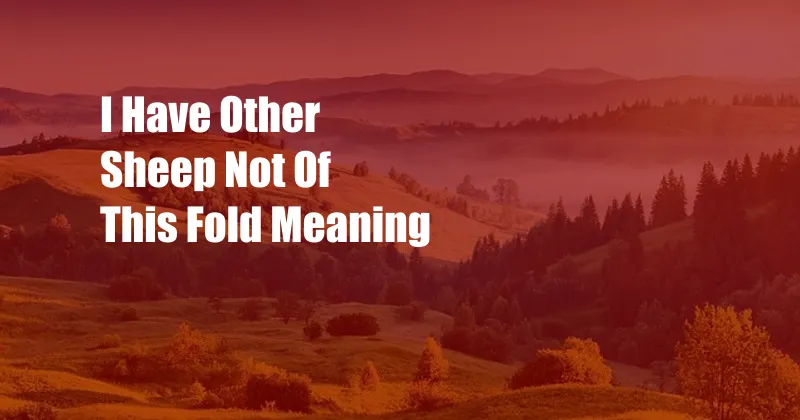
I Have Other Sheep Not of This Fold: Understanding Jesus’ Metaphor
The Shepherd, the Sheep, and the World
In the gospel of John, Jesus uttered a cryptic yet profound statement: “I have other sheep that are not of this fold.” This enigmatic phrase has sparked centuries of debate and interpretation, inviting us to explore the deeper meanings behind Jesus’ words. To unravel the significance of this metaphor, we must first understand the context in which it was spoken.
Jesus was speaking to a group of Jews who were challenging his authority and questioning his claim to be the Messiah. In response, Jesus employed a powerful analogy, likening himself to a shepherd and his followers to sheep. The “fold” represented the Jewish community, from which Jesus’ message had initially emerged. However, Jesus’ statement hinted at a broader mission, extending beyond the confines of the Jewish faith.
The Other Sheep: Gentiles and Believers from All Nations
The “other sheep” referred to by Jesus were not part of the Jewish fold. They represented Gentiles, people from non-Jewish backgrounds who would come to believe in him. This concept was revolutionary in a time when religious and cultural boundaries were strictly enforced. Jesus’ words shattered these barriers, opening the door for salvation to all who would receive it, regardless of their ethnic or religious heritage.
The inclusion of Gentiles into the “fold” was a testament to Jesus’ universal message of love and redemption. He came to save not just a select few, but all who would believe in him. The metaphor of the sheep and the fold emphasized the unity and diversity of the Church, which would encompass people from all walks of life, united by their shared faith in Jesus Christ.
The Implications for Us Today
Jesus’ statement continues to resonate today, reminding us of the inclusivity and universality of the Christian faith. It challenges us to embrace diversity and welcome people of all backgrounds into the fold of Christ’s followers. As Jesus said, “Whoever comes to me I will never cast out” (John 6:37).
Practical Tips for Welcoming the “Other Sheep”
- Create a welcoming and inclusive environment: Make your church or community group a place where people from different cultures and backgrounds feel comfortable.
- Seek out opportunities to engage with non-believers: Attend community events, participate in outreach programs, and engage in conversations with those who may not have encountered the gospel before.
- Be patient and understanding: It may take time for people to come to faith in Jesus. Respect their journeys and offer support and encouragement along the way.
- Celebrate diversity: Highlight the richness and beauty that comes from having people from all walks of life in the Church.
Frequently Asked Questions
What does the fold represent?
The fold represents the Jewish community or the established religious order.
Who are the other sheep?
The other sheep are Gentiles or non-Jewish people who believe in Jesus.
Why did Jesus use the metaphor of sheep and the fold?
Jesus used this metaphor to emphasize the unity and diversity of the Church, which would include people from all backgrounds.
Conclusion
Jesus’ statement, “I have other sheep that are not of this fold,” is a testament to the universal and inclusive nature of the Christian faith. It calls us to embrace diversity, welcome the “other sheep” into the fold, and share the message of God’s love with all people, regardless of their background or beliefs.
Are you interested in learning more about the topic of “I have other sheep not of this fold”? If so, I encourage you to explore the following resources: